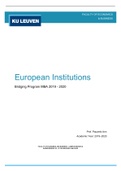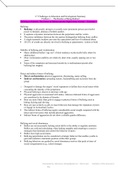& BUSINESS
European Institutions
Bridging Program MBA 2019 - 2020
Prof. Pauwels Ann
Academic Year: 2019–2020
FACULTY OF ECONOMICS AND BUSINESS - CAMPUS BRUSSELS
WARMOESBERG 26 – B 1000 BRUSSELS BELGIUM
,EUROPEAN INSTITUTIONS
CONTENT OF THE COURSE
The European political-institutional context
1.1 Introduction
1.2 The institutions of the EU and decision-making in the EU
1.3 EU-policy
1.3.1 The international market
1.3.2 The economic and monetary union
1.3.3 The competition policy
1.3.4 The external relations of the EU
LEARNING OUTCOMES
• The student masters the functioning of the institutions of the European Union
• The student masters the major European policy areas and their impact on business
• The student identifies the international (European) environment in which companies, and in particular
multinationals, operate
• The student analyses and explains current European issues
• What kind of entity is the European Union?
some basic concepts which are important to understand the functioning and the policy of the EU
• Where did the EU come from and how has it evolved? (history of European integration)
Where did the first ideas come from to launch/ promote a European co-corporation? + Why?
• How is the EU governed? (Majority institutions of the EU & Decision-making in the EU)
Who takes the decisions in the EU: commission, member states, the people, the parliament? …
• What are the results of its work? (policy outputs: study the functioning of the internal market, the
economic and monetary union, competition policy of the EU, the external relations of the EU)
EXAM
• No multiple-choice questions, only open and closed questions
• The exam will consist of true or false statements and essay questions
• See example exam questions (last class)
1
,EVALUATION MODULE EUROPEAN INSTITUTIONS
A. Examples of true or false statements
Are the following statements true or false? Explain in a few sentences.
Comment: The explanation is decisive because sometimes a statement can be both true and false
Statement 1: In 2001 the Commission imposed a fine on Hoffmann-La Roche because the company abused its
dominant position in the market of vitamins.
False, the European Commission fined Hoffmann-La Roche and seven other companies for participating in eight
distinct secret market-sharing and price-fixing cartels affecting vitamin products. The companies involved fixed
prices for the different vitamin products, allocated sales quotas, agreed on and implemented price increases.
Statement 2: A directive creates rights and obligations for individuals, and they can therefore invoke it directly
before national courts.
False, a directive is a legislative act that is binding, as to the result to be achieved, upon each member state to
which it is addressed. It leaves the member states the choice of form and methods on how to reach these
goals. Therefore, a directive as such cannot directly create rights and obligations for individuals.
Statement 3: The European Council plays a major role in the decision-making process of the EU.
False/true, although the European Council has been recognized by the Treaty of Lisbon as an institution of the
EU, it has no legislative power in the EU. However, from a political perspective, it is a strategic body that
provides the EU with general political directions and priorities and solves crisis situations in the EU.
B. Example of essay question
Question 1: What are the major benefits of the EU single market for companies? Mention at least 3 benefits.
(1) The single market seeks to guarantee the free movement of persons, goods, services and capital.
(2) Free movement of persons means that EU citizens can work in another EU member state without needing a
work permit and reside there for that purpose. Restrictions on labour mobility are forbidden. Therefore,
companies can attract skilled workers from other EU member states.
(3) Free movement of persons also includes the right of establishment, meaning the right to set up a business
in another member state. Therefore, it also guarantees mobility of businesses. Companies can set up
subsidiary companies in other member states and expand their operations.
• Free movement of services is about the right to provide services in another member state on a temporary
basis without being subjected to discriminatory measures. Therefore, businesses can expand their
operations, without being subjected to discriminatory and other measures.
• Free movement of goods means the removal of customs barriers between the member states (and one
common external tariff for trade with third countries), the removal of quantitative restrictions and all other
measures and rules which are capable of hindering, directly or indirectly, actually or potentially, intra-
Community trade (the so-called non-tariff barriers (subsidies, national product regulations and standards)).
Therefore, companies have access to cheaper products and also have access to a bigger market to sell their
goods without being subjected to different national product regulations and standards. The absence of
physical border has also cut delivery times and reduced costs for companies drastically.
• Free movement of capital means the prohibition on all restrictions on the movement of capitals and
payments in the EU. Therefore, companies can attract investments to grow in the EU.
• A more general aspect and benefit of the single market is that businesses only have to deal with one set of
rules when exporting to or operating in more than one-member state. This leads to less bureaucracy,
paperwork and consequently less expenses as well.
2
, 1 INTRODUCTION
What is the European Union? (some basic concepts)
The European Union (EU) consists of a group of countries that acts as one economic unit in the world economy. Its official
currency is the euro; 19 of its 28 members have adopted the currency.
The EU grew out of a desire to form a single European political entity to end the centuries of warfare among European
countries that culminated with World War II and decimated much of the continent. The European Single Market was
established by 12 countries in 1993 to ensure the so-called 4 freedoms: the movement of goods, services, people, money.
It’s an alliance between states, where they establish common rules applicable to all member states (f.e. free
transport of goods). They have different legal (economic) entities. They give up their sovereignty to form an
alliance (= international organization from a legal point of view). So the EU is an example of an international org.
Features of an international organization (common rules): free trade, the population rights, migrations, how
they are represented in other international organizations, but also need rules for the functioning of the EU (who
takes the decisions of their internal functioning, budgeting, membership, legal values of all decision-making) à
all these rules are laid out in what we call a treaty (= constitution). So an international org (f.e. EU) is always
established by means of a treaty, a legal binding document for the states involved (= member states).
Representatives in organs of the organizations à in each international org. you have a number of organs
You create organs with a different or distinct will from the members of the organizations, so it’s more than just
sitting there as member states, you create your own legal entity, a distinct will and that's extremely important
when you talk about an international organization.
Another important feature from a legal perspective and that is the fact that any international organization has
rights and duties under international law, this is called international legal personality. So every international
organization f.e. the EU, United Nations, WTO (World Trade Organization), they enjoy international legal
personality. This basically means that they have specific rights and duties under international law.
Other examples of international organizations: à they all have their own
• United nations (UN) constitutions and organs
• World trade organizations (WTO) (international legal personality)
• The organizations for economic corporation and development (OECD) UNICEF (is not a separate international
• International Monetary Fund (IMF) org, it’s integrated in the UN, it’s the
• North American Free Trade Agreement (NAFTA) children fund of the UN, so it is part of
• Organization of the Petroleum Exporting Countries (OPEC) the UN, but has no separate
• South Asian Association for Regional Cooperation (SAARC) international legal personality, it’s kind
• World Health Organization (WHO) & World Bank of an autonomous organ within the UN)
The EU is also an example of an international organization but it’s more unique. Emphasis on the distinction
between supranational organizations vs intergovernmental organizations
(1) A supranational organization is an international group or union in which the power and influence of
member states transcend national boundaries or interests to share in decision making and vote on issues
concerning the collective body. The European Union and the World Trade Organization are both
supranational entities.
(2) An intergovernmental organization (IGO) refers to an entity created by treaty, involving two or more
nations, to work in good faith, on issues of common interest. In the absence of a treaty an IGO does not
exist in the legal sense. For example, the G8 is a group of eight nations that have annual economic and
political summits. IGOs that are formed by treaties are more advantageous than a mere grouping of nations
because they are subject to international law and have the ability to enter into enforceable agreements
among themselves or with states.
3












